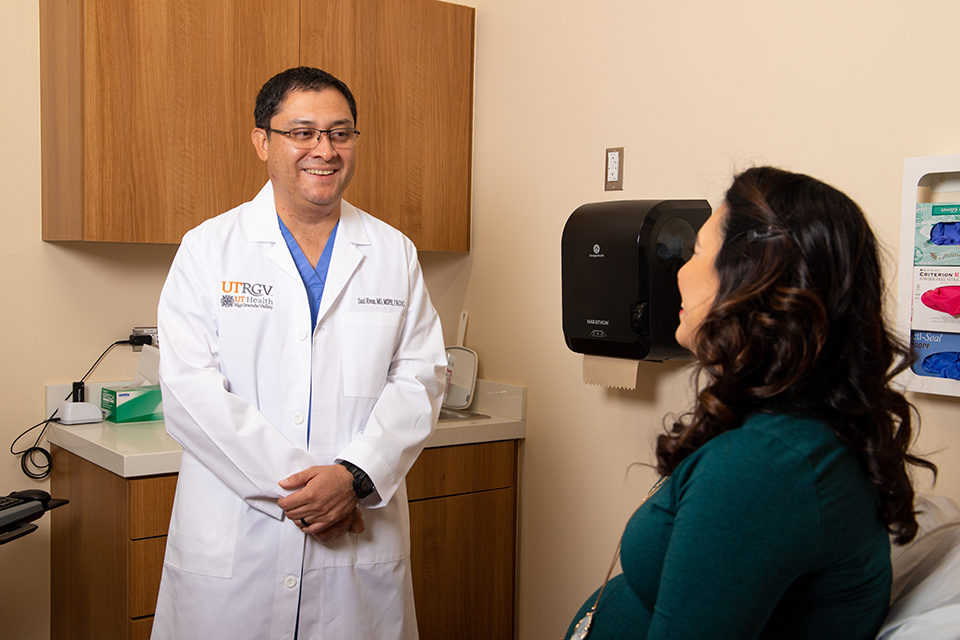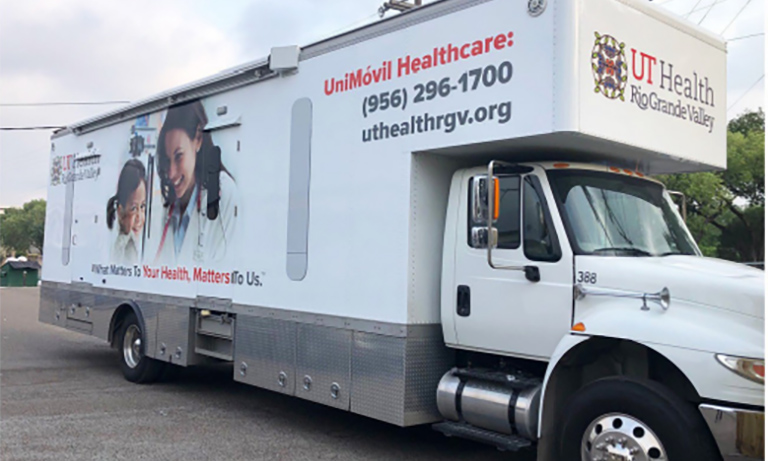- March 30, 2024
Healthy Mujeres program providing services to underserved Valley women since 2017
 UTRGV Archival Photo by Jennifer Galindo
UTRGV Archival Photo by Jennifer Galindo
Saira Cabrera
RIO GRANDE VALLEY, TEXAS – MARCH 27, 2024 – More than 1,600 women in the Rio Grande Valley received healthcare last year. And since 2020, more than 9,000 have received outreach and education, thanks to the Healthy Mujeres program, a University of Texas System Population Health-backed project in collaboration with UT Health RGV, the clinical arm of The UTRGV School of Medicine.
This Women’s History Month, the Healthy Mujeres program has worked to reduce neonatal morbidity rates in Texas – among the highest in the country – by offering vaccinations, screening services, ultrasounds, pregnancy testing, and other preventative and reproductive health services for low-income and underserved communities since 2017.
Dr. Saul D. Rivas, assistant professor of Obstetrics & Gynecology under the Women’s and Children’s Division of the Department of Primary and Community Care at the UTRGV School of Medicine, site principal investigator and medical director for Healthy Mujeres, said the program is designed to provide health services to underserved women in the Valley, as part of the ongoing effort to provide accessible, confidential and cost-effective healthcare services across the South Texas border.
“This initiative started in 2017 as a collaboration between the UTRGV School of Medicine’s Department of Primary and Community Care and the UniMóvil team, which began with the idea of using UniMóvil to provide women’s care,” said Rivas. “We were focused on providing long-acting reversible contraception, which are IUDs and implants. Our first clinic opened in October 2017.”
After the clinic was established in San Carlos, he said, the UniMovil team started going to various areas around the Valley once a month to provide women with health services.
“Our focus was on providing care to underserved women in the Rio Grande Valley. Throughout the years, we’ve been collaborating with the team from the UniMóvil,” he said. “Also, with the AHEC (Area Health Education Clinic) team, we now have three clinics across the Valley.”
PROVIDING CARE TO PATIENTS
The UniMóvil serves La Victoria, San Carlos and the Brownsville area to provide quality care to women who otherwise would not have access to those resources.
The Healthy Mujeres team consists of two physicians, a nurse practitioner, a medical assistant/community healthcare worker, and, at times, one resident physician and one medical student.
The main objectives of the Healthy Mujeres program are to:
- Educate women on prioritizing their health.
- Offer critical healthcare services, including cervical cancer screenings and contraceptives.
- Supply preventative healthcare services, including mammogram examinations.
- Provide vaccinations to prevent and treat STDs (sexually transmitted diseases).
“Our team also seeks to provide care for pregnancy early on because there’s an issue in our communities regarding prenatal care that we see with many patients,” Rivas said. “Either because they have no prenatal care, or they start their prenatal care late in their pregnancy. And this largely has to do with access to healthcare.”

IMPROVING ACCESS
The Healthy Mujeres team focuses on reaching out to women in rural or other areas where it is hard to see a doctor, Rivas said, and several grants allow them to provide services for little or no cost if patients qualify.
Since the program’s inception, which primarily served areas in Hidalgo County once a month, the project now provides women’s health services twice a month to Starr County and Cameron County.
“More recently, we’re about to go into Willacy County,” Rivas said, “and we plan to have a location in Raymondville.”
Rivas said they’ve had substantial success with the program.
“People have been very pleased with our services. We usually have a full clinic every time we visit a site,” he said. “We’ve continued to expand. We used to go once a month, and now we’re going twice a month on the UniMóvil. And we also see patients a couple of times a week at the San Carlos clinic.”
A BRIGHT FUTURE
Rivas said people generally have a good sense of why it’s essential to seek medical care, even when they are not sick, to prevent health issues down the road. However, he believes the main problem is that a large portion of the community doesn’t have health insurance in this region.
The Healthy Mujeres program provides access to preventive tests and screenings and connects women to healthcare resources.
Whether it’s informing the community about Medicaid, healthcare services, or funding, the program aims to help patients find the necessary resources for medical care.
“I think the future looks bright. We’re working on continuing to expand,” Rivas said. “I think we’ll be able to continue to provide services for the communities who need it most.”
“We’re thrilled to be part of the School of Medicine, which aims to provide care to underserved populations in the Valley. Thanks to these grants, we’re able to do so,” Rivas said. “We have a team focused on providing these services, and I encourage everybody to consider reaching out to us if they need them.”

